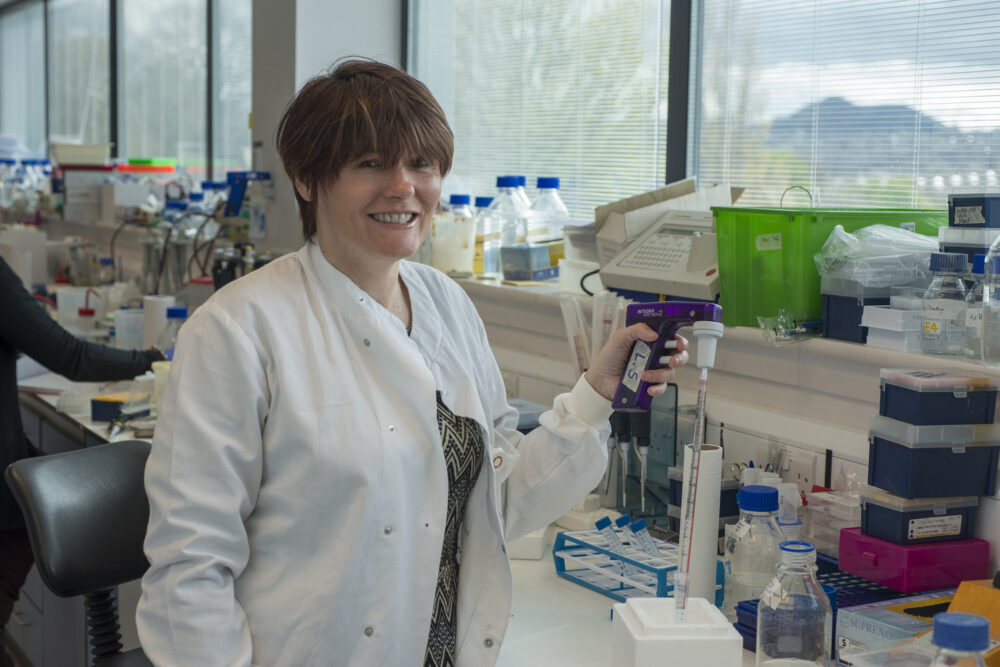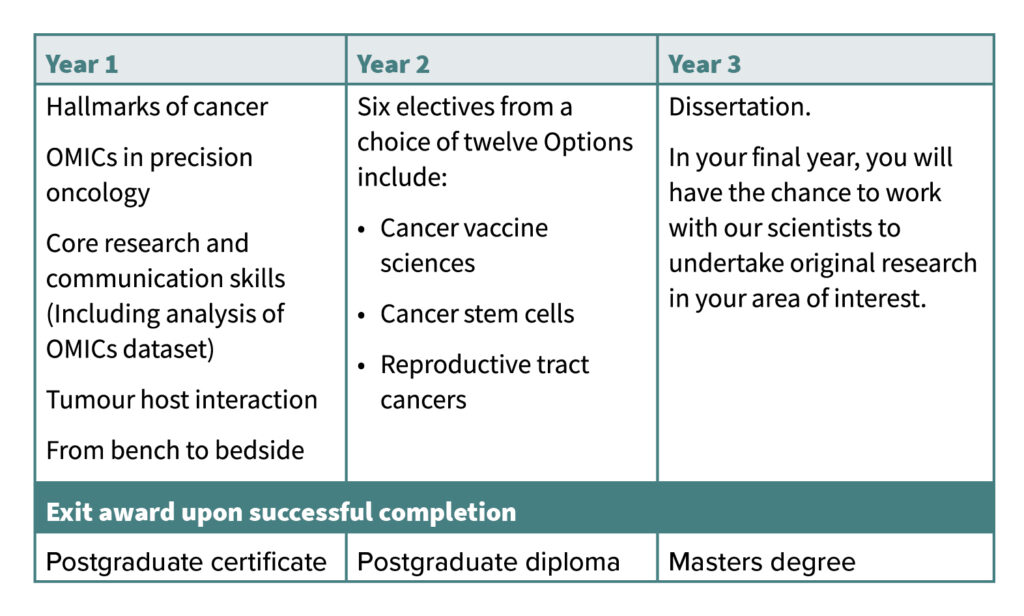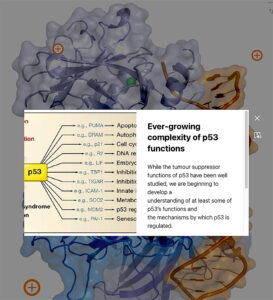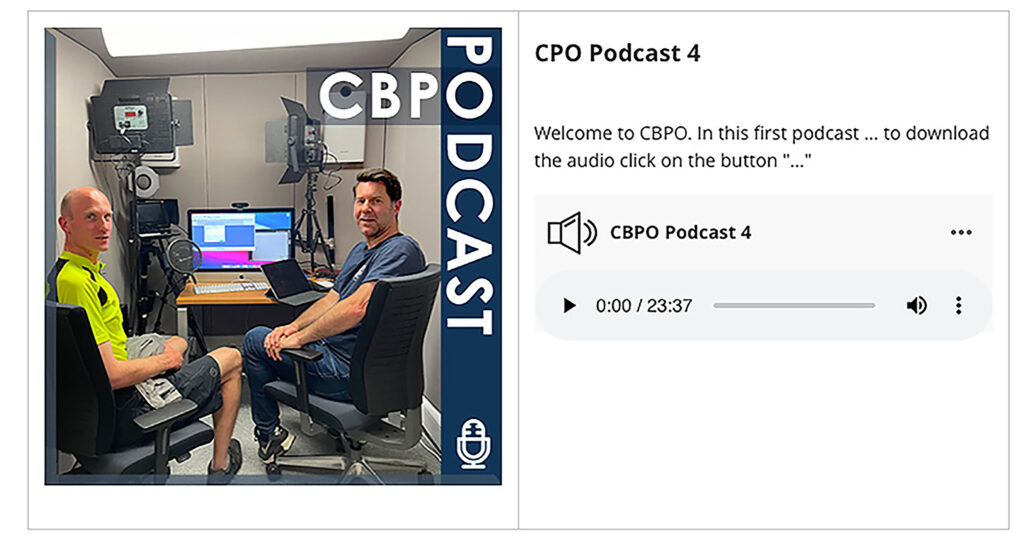A Year on: The online MSc in Cancer Biology and Precision Oncology

By Cherry Ferrier
Communications Manager, Institute of Genetics and Cancer
I recently spoke with the Institute’s Director of Teaching and Learning, Professor Lesley Stark (above), to reflect upon the first year of a new part-time online MSc programme in cancer biology and precision oncology at the University of Edinburgh.
Lesley’s passion for the programme was palpable. I was intrigued to learn about what goes on behind the scenes to create the many hours of content required for a brand new, fully online course (during a global pandemic, no less) and to hear how the programme’s first year students have enjoyed their online learning experience.
About the MSc
Last year, Times Higher Education ranked Edinburgh as the 19th Most International University in the World. Students from 180 different countries have studied here over the past 10 years, and the new MSc has been no exception when it’s come to attracting a global audience. There’s something to be said for obtaining an education from one of the oldest medical schools in the English-speaking world.
Perhaps the most modern approach to medical education at Edinburgh yet, the fully online MSc in Cancer Biology and Precision Oncology was launched in 2022, attracting applicants from around the globe – from the United States to China – from a diversity of disciplines.
Part-time study has allowed professionals from oncology, biomedical science, genetic counselling, the pharmaceutical industry and specialist nursing to embark upon an in-depth understanding of the molecular biology of cancer, while developing a ‘bench to bedside’ frame of mind to translate this understanding into individualised cancer therapies and improved diagnostics.
Those who enrolled last September have now completed their first year of the programme and will soon be entering their second, while a new cohort of students – including medical professionals, scientists and investment bankers with interests in oncology – will enter the programme from the start.

Lesley, who is Chair of Nucleolar Signalling and Cancer Prevention at Edinburgh Cancer Research, is looking forward to welcoming them onto the course.
“The diversity of backgrounds is amazing and the feedback from last year’s students was really good. It was a lot of work to make all the resources from scratch last year but we learnt a lot and look forward to sharing them with this year’s cohort.”
The programme has been met with huge support from scientists and clinicians based at the Institute of Genetics and Cancer, and from the wider cancer research community.
Course content

ThingLink is an interactive approach to learning through illustration.
The team running the course have generated a significant volume of innovative teaching materials which will be of value to the wider University community for years to come.
This includes popular podcasts in which, for example, researchers and clinicians discuss how advances in biological understanding of cancer have translated to patient benefit.
Thinglinks are an interesting approach to biomedical illustrations – engaging, media-led immersive learning that teaches students through the use of interactive tagged images.
As part of the omics course, students were able to quiz Clinical Director of the Cancer Research UK Scotland Centre, Professor Charlie Gourley, on the use of omic technologies to advance the early detection of ovarian cancer.
The core skills component included analysis of a real-life transcriptomic dataset generated at the Institute with discussion and support from the researchers involved in the study.
In addition to academic understanding, the first year features a large public engagement component where students learn ways of communicating complex scientific concepts to patients and the public.
An Institute-wide effort
Lesley, who is Director of the Programme, was open and honest about the amount of work that goes in to creating a fully online course from scratch and thanked the Institute’s multi-disciplinary community for the team-effort that has gone into producing high-quality course content and online learning experiences for the programme’s MSc students.
Lesley said, “I and our Deputy Director Kathryn Ball would like to thank our teaching fellow, You Ying Chau, and all those PIs, postdocs, PhD students and clinicians who took time to contribute lectures, to answer discussion board questions and to mark assessments. Particular thanks go to Alesandro Brombin, Pippa Thompson, Crispin Jordan, Dee Davison, Jana Travnickova, Sachin Wani, Caroline Michie and Alex Loftus, who all gave a lot of their time to help run courses.”

The Podcasts available through the MSc have proved popular with students.
What the students have to say
This left me wondering, what have the students made of the course so far? Here’s what they had to say.
The Cancer Biology and Precision Oncology course has greatly supplemented my clinical training in enhancing my research skills, which is a valuable skillset for every healthcare professional. It allows learners to process a multidisciplinary skillset and knowledge required to design and conduct precision medicine research. The part-time online course also provides flexibility to full time clinicians like myself to learn at my own pace, and the course fully reflects and supports this. Lastly, the course has provided an enjoyable platform to learn from the experts, and to interact with my colleagues from different parts of the world.
– Juin
Clinical Registrar, UK
I found the first year of the programme to be very pleasurable. The courses were very well organized. The professors did an amazing job in keeping the lectures very engaging and interesting from start to finish. I found myself looking forward to studying the next chapter, the next module and the next concept throughout the year. The CBPO podcasts were the best part. It was fascinating to hear research scientists and clinicians discussing how laboratory research is applied to the field of medicine and the treatment of patients.”
– Faizan
Biomedical Scientist, Pakistan
I just finished year 1 and I could not be happier. Initially working full time while studying part time seemed quite daunting to me, but the course work was so well structured and there was such great support available from the course organisers and teaching staff that I felt immediately empowered to dive into the course. I really enjoyed the various learning formats and materials used, including podcasts, and also hearing from other students through group assignments and discussion boards. My favourite part of the course were the assessments – this sounds quite hard to believe, but the assessments were varied and creative, and allowed effective application of learning and I even had fun in the process!
– Jelena,
Pharmaceutical industry training manager, UK
Apply now
2023 entry to the MSc in Cancer Biology and Precision Oncology is open for application until 25 August 2023.
For course details, fees and information on how to apply visit the University of Edinburgh website.




